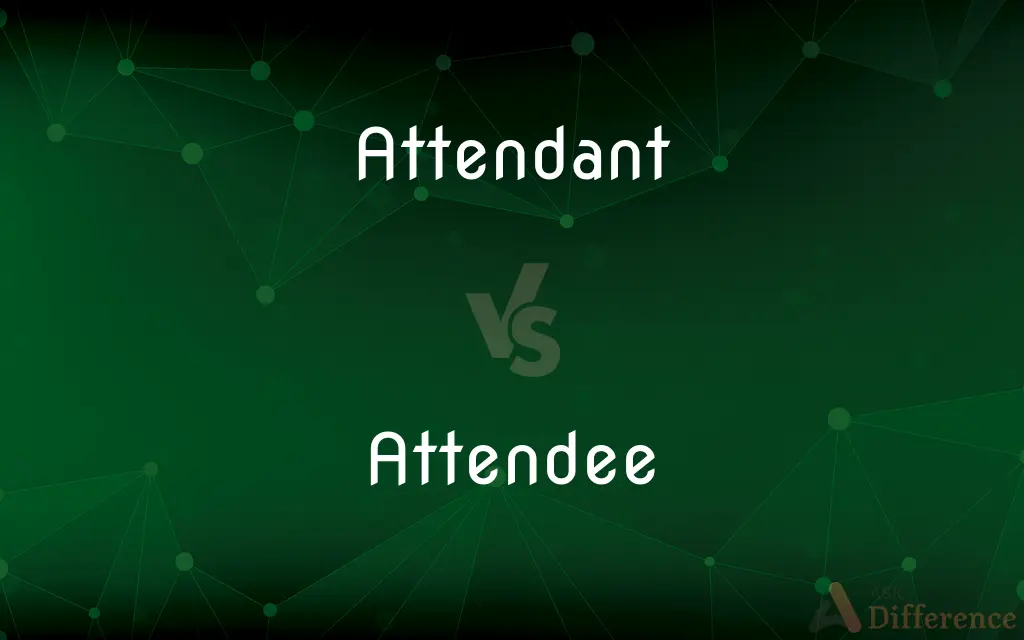Attendant vs. Attendee — What's the Difference?
By Tayyaba Rehman — Updated on September 26, 2023
An attendant is someone employed to provide a service to people, while an attendee is a person who is present at a specific event or venue.

Difference Between Attendant and Attendee
Table of Contents
ADVERTISEMENT
Key Differences
The terms attendant and attendee refer to different roles people can have, one being service-oriented and the other relating to presence at events. An attendant is someone who is employed to assist, serve, or provide a specific service to others, often in settings such as hospitals, airplanes, or parking lots. Their role is primarily focused on providing assistance or ensuring the well-being and comfort of others, taking proactive actions to meet the needs of those they are serving.
In contrast, an attendee is someone who attends or is present at an event, meeting, or venue. Attendees are there to participate, observe, learn, or be entertained, rather than to provide a service. They could be at a conference, a concert, or a party, absorbing the information, entertainment, or social interactions available at the event. Attendees are generally the recipients of the efforts of organizers, speakers, performers, and, often, attendants.
The differentiation between an attendant and an attendee is primarily in their purpose and actions. The attendant is there to serve, assist, and ensure smooth functioning or experiences for others. Their role is active, focused on doing things for others, from providing information to ensuring safety. They are the ones who respond to needs, manage issues, and maintain order and services.
On the other hand, an attendee is there to experience, to be part of the audience or the participant group. They are the consumers of the event’s content, services, and experiences. Their role is more passive, focused on receiving, experiencing, and possibly, interacting, but not on providing services or managing the event.
In essence, while attendants are characterized by their service-providing roles, attending to the needs and well-being of others, attendees are characterized by their presence and participation in events, benefiting from the experiences, knowledge, or entertainment provided.
ADVERTISEMENT
Comparison Chart
Definition
Someone employed to provide a service to people.
A person who is present at a specific event or venue.
Role
Service-oriented, assists, serves, or provides specific services.
Passive, is present to experience, learn, or observe.
Interaction
Active, responds to needs, manages issues.
Passive, receives and consumes the content or services.
Settings
Hospitals, airplanes, parking lots, etc.
Conferences, concerts, parties, etc.
Purpose
To ensure smooth functioning and provide assistance.
To participate, observe, and experience the event.
Compare with Definitions
Attendant
A person employed to assist or provide a service to others.
The parking attendant guided the drivers to available spots.
Attendee
A person who is present at an event or a venue.
Every attendee received a welcome package at the conference.
Attendant
A person assigned to take care of or accompany another.
The museum attendant provided information about the exhibits.
Attendee
An individual who participates or observes activities at a specific event.
The concert had thousands of attendees enjoying the music.
Attendant
An individual who serves and ensures the well-being of others in specific settings.
The flight attendant ensured all passengers were comfortable during the flight.
Attendee
An individual present at an event to absorb information or entertainment provided.
The attendees of the book fair were excited to meet their favorite authors.
Attendant
Someone responsible for managing and responding to the needs of people.
The attendant at the hospital assisted patients with their needs.
Attendee
Someone who is part of the audience or participant group in an event.
Each attendee at the workshop contributed to the discussion.
Attendant
One who attends or waits on another.
Attendee
A person who goes to an event to experience, learn, or be entertained.
The seminar attracted a diverse group of attendees interested in the topic.
Attendant
One who is present.
Attendee
One who is present at or attends a function. See Usage Note at -ee1.
Attendant
An accompanying thing or circumstance; a concomitant.
Attendee
A person who is in attendance or in the audience of an event.
Attendant
Being present
Ships and attendant sailors.
Attendee
(uncommon) A person who is attended.
Attendant
Accompanying or following as a result
Attendant circumstances.
Attendee
A person who participates in a meeting;
He was a regular attender at department meetings
The gathering satisfied both organizers and attendees
Attendant
One who attends; one who works with or watches over something.
Give your keys to the parking attendants and they will park your car for you.
Attendant
A servant or valet.
Attendant
A visitor or caller.
Attendant
That which accompanies or follows.
Attendant
(legal) One who owes a duty or service to another.
Attendant
Going with; associated; concomitant.
They promoted him to supervisor, with all the attendant responsibilities and privileges.
Attendant
(law) Depending on, or owing duty or service to.
The widow attendant to the heir
Attendant
Being present, or in the train; accompanying; in waiting.
From the attendant flotilla rang notes triumph.
Cherub and Seraph . . . attendant on their Lord.
Attendant
Accompanying, connected with, or immediately following, as consequential; consequent; as, intemperance with all its attendant evils.
The natural melancholy attendant upon his situation added to the gloom of the owner of the mansion.
Attendant
Depending on, or owing duty or service to; as, the widow attendant to the heir.
Attendant
One who attends or accompanies in any character whatever, as a friend, companion, servant, agent, or suitor.
Attendant
One who is present and takes part in the proceedings; as, an attendant at a meeting.
Attendant
That which accompanies; a concomitant.
[A] sense of fame, the attendant of noble spirits.
Attendant
One who owes duty or service to, or depends on, another.
Attendant
Someone who waits on or tends to or attends to the needs of another
Attendant
A person who participates in a meeting;
He was a regular attender at department meetings
The gathering satisfied both organizers and attendees
Attendant
Following as a consequence;
An excessive growth of bureaucracy, with related problems
Snags incidental to the changeover in management
Attendant
An individual whose job is to serve customers or guests.
The attendant at the spa guided the guests to the locker rooms.
Common Curiosities
Can an attendant be found in settings like hospitals or airplanes?
Absolutely, attendants often work in settings like hospitals and airplanes to assist and serve others.
Is an attendant someone who provides services or assistance?
Yes, an attendant is employed to provide services or assistance to others.
Is the role of an attendee generally more passive compared to an attendant?
Yes, attendees generally have a more passive role, focused on receiving and experiencing, unlike attendants who actively provide services.
Does an attendee refer to someone present at an event?
Correct, an attendee is a person who attends or is present at an event or venue.
Share Your Discovery

Previous Comparison
Blessed vs. Blest
Next Comparison
Sheriff vs. MarshalAuthor Spotlight
Written by
Tayyaba RehmanTayyaba Rehman is a distinguished writer, currently serving as a primary contributor to askdifference.com. As a researcher in semantics and etymology, Tayyaba's passion for the complexity of languages and their distinctions has found a perfect home on the platform. Tayyaba delves into the intricacies of language, distinguishing between commonly confused words and phrases, thereby providing clarity for readers worldwide.















































